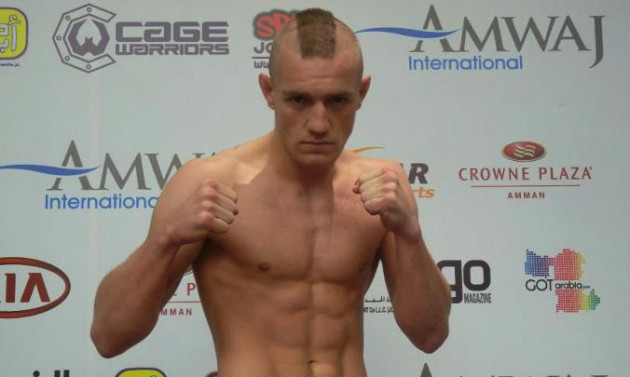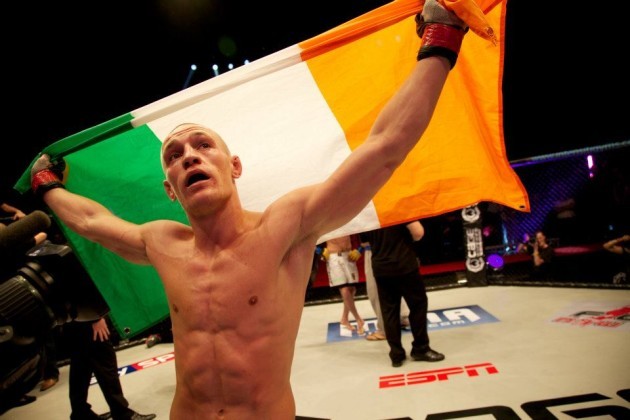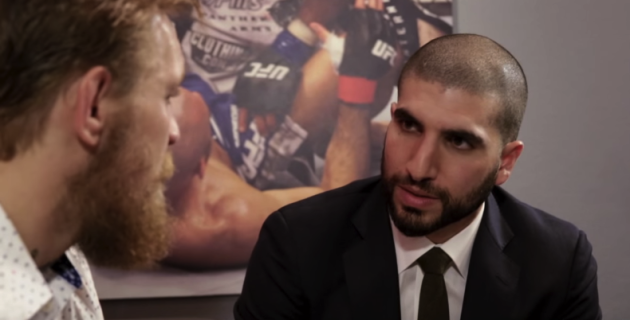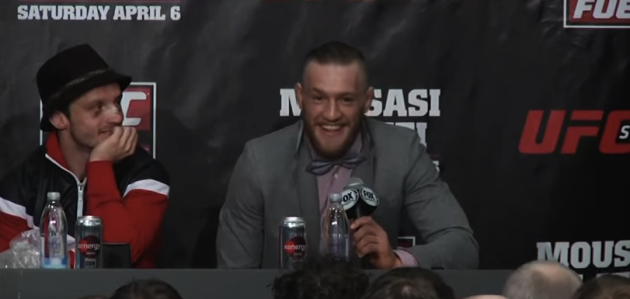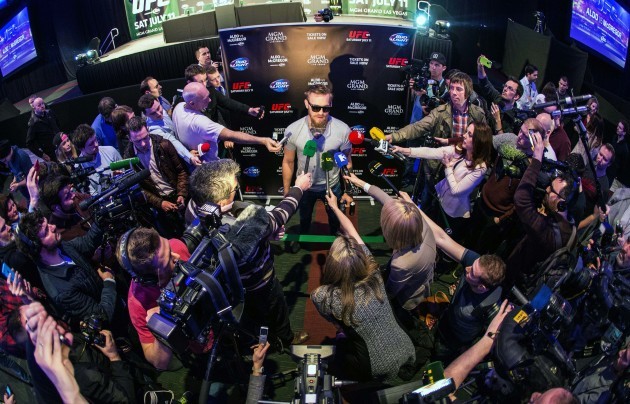— Paul Dollery reports from Las Vegas
IN A HOTEL conference room in central Amman, 16 professional MMA fighters and their coaches are gathered, waiting for their turn to approach the scales.
On the streets outside, the inhabitants of Jordan’s capital go about their lives as normal, oblivious to the fact that a man who’ll be the biggest male star in the sport of mixed martial arts within three years is about to put on a show in a small arena in their city, in front of an audience that just about reaches four figures.
A room full of ravenous, dehydrated fighters is an unremarkable place to be. During the final minutes of a weight-cut, idle conversation doesn’t appeal to them. The place would be silent were it not for the soundtrack of a strong Dublin accent, which emanates from one huddle of fighters and doesn’t seem likely to stop.
His team-mates, Cathal Pendred and Aisling Daly, aren’t in a talkative mood, but the Dub in the white t-shirt and grey sweat pants with the tightly-shaved mohawk haircut isn’t discouraged. As I observe him bouncing around on the balls of his feet, shadow boxing, engaged in an unrequited discussion while he waits to weigh in, it becomes abundantly clear that this guy isn’t cut from the same cloth as his peers in the vicinity.
That was my first event in my previous role as press manager for Cage Warriors Fighting Championship, and my first encounter with Conor McGregor. I was already familiar with him at that stage. The majority of people you spoke to on the domestic MMA scene would point out that he was ‘one to watch’, but just 10 months earlier he had been beaten by Joseph Duffy. His status as a hot prospect had subsequently taken a hit.
But that was the verdict of those on the outside looking in. McGregor was clearly unaffected. Given his demeanour at the Cage Warriors Fight Night 2 weigh-ins in Amman, you could have been forgiven for assuming that he was an all-conquering world champion. McGregor exuded certainty, not confidence.
The night after the weigh-ins, McGregor stepped into the cage and beat up Aaron Jahnsen — a considerably larger opponent — for one minute and 31 seconds until the referee decided the Norwegian fighter had endured enough. As McGregor charismatically assured the crowd in his post-fight interview that he’d soon be a world champion, my only thought was that I was already looking forward to seeing him fight again.
That was September 2011. In 2012, McGregor would go on to take over two different divisions in the CWFC promotion. I’d be lying if I claimed I knew, back then, exactly the extent of McGregor’s potential. However, tasked with the responsibility to publicise the company and its athletes, what I did know was that I wanted to hear more about McGregor, because I was sure he had more to say.
Not long after that win against Aaron Jahnsen, I contacted McGregor to arrange an interview for the CWFC website. “No problem,” he said. “I’m just going to training now. Give me a ring later.”
Fast forward a few days and his phone was still ringing out. We weren’t looking for a feature-length excavation of his life or anything like that; just a few brief thoughts on his next fight, which would be against Steve O’Keefe the following February. Instead, I opted to e-mail some questions to him as a last resort.
It must have been a couple of weeks later when an e-mail from Conor McGregor landed in my inbox: “Sorry for missing your calls and I’m only after seeing the e-mail today. I don’t check this thing much. Here’s that interview anyway, I made it worth the wait ha ha ha…”
And so he did. McGregor proceeded to explain how every fighter in the featherweight division — not just Steve O’Keefe — wasn’t on his level. McGregor said anyone who signed the contract to fight him would pay the price for even considering the thought that they could actually win. Nobody was going to get between him and the belt.
“There’s only going to be one outcome on the night. I’m too slick for these guys in all ranges. I hit like a heavyweight and move like a flyweight. I was ready for this fight yesterday, let alone in eight weeks.”
It was hardly the prose of Seamus Heaney but it served its purpose in getting people talking.
After beating Steve O’Keefe in just over a minute, McGregor went on to defeat Dave Hill to win the Cage Warriors featherweight belt in June. It was then that talk of ‘McGregor to the UFC’ began to gather momentum. He was incredibly impressive against Hill, but the reality was that the UFC needed to see a little bit more before making their move.
McGregor next stepped into the cage on New Year’s Eve in a bout for the Cage Warriors lightweight belt against Ivan Buchinger. This would be the fight in which McGregor would finally face an acid test of his worth, he was told… not for the last time. He was aiming to become the first fighter to simultaneously hold Cage Warriors titles in two unified weight classes.
Three weeks before the fight, McGregor was in Glasgow to corner his team-mate, Owen Roddy, who would fight Wilson Reis at Cage Warriors 50 in what turned out to be one of the best fights seen on the European circuit for years.
Conscious of the likelihood of his upcoming bout with Buchinger being his last for Cage Warriors before heading to the UFC, I asked McGregor if he’d be willing to give the fight a big push in terms of publicity during the final stages of the build-up.
He was keen. Fighting for another prestigious title in his hometown, he wanted the exposure. The interest of the national media in Ireland was subsequently gauged — “This guy could be a big star in the MMA world very soon” was the pitch — but nobody took a bite.
“Fuck it,” McGregor said. “It won’t be long before they’re the ones coming to me looking for interviews. We’ll see what it’s like when the tables are turned. The ones who have been there from the start will get the first interviews, the other ones can join the back of the queue.”
I spent the first day of 2013 responding to e-mails and phone calls from MMA media outlets from around the world. They wanted interviews, photos, footage and whatever information was available about Conor McGregor, the fighter whose stunning KO of Ivan Buchinger the night before had clocked up a quarter-of-a-million YouTube views in less than 24 hours.
Five weeks later, McGregor signed a UFC contract and the mainstream media began to take notice. If observers were hesitant to tip him for stardom after the Jahnsen fight, that was no longer the case by the time he picked up his second Cage Warriors belt. Only his charisma could match his fighting skills and the turning point for putting his personality on show to the world came a few weeks before his UFC debut against Marcus Brimage in April 2013.
Ariel Helwani, the host of hugely popular video podcast The MMA Hour, eventually gave in and invited McGregor to feature as a guest on the show after being hounded online by the fighter’s growing fanbase.
“Conor started to really get on my radar after he won the first Cage Warriors title,” Helwani explains. “Then I recall after he won the second, I was bombarded by Irish fans just asking what I thought of their guy. They just wanted to know. I love that about the Irish fans.
“I truly realised then that Conor was more than just a champion in some organisation — he had an incredibly loyal following. That’s when the requests for him started coming in.
“After his UFC debut was announced, I was getting demands. I remember being in Vegas for UFC 156 and sending him a direct message on Twitter about having him come on — not really knowing how he’d be on air. He replied relatively quickly, which was nice, and we were off.”
As McGregor was introduced to The MMA Hour’s audience via a Skype call — “What’s happening, mate? Conas atá tú?” — he snacked on blueberries and disclosed his big ambitions, overlooking his lack of experience at the highest level and the fact he barely had a penny to his name. Helwani welcomes the biggest names in the sport to his show every week, but he soon realised that McGregor wasn’t a regular UFC debutant.
“That was clear to me — no joke — within the first 60 seconds,” he says. “I’m pretty sure you can see my eyes lit up right away. I’d say that’s a top 10 moment [in the history of The MMA Hour], for sure, because of the unknown at the time, what he said and how it all came true. Also, some of his lines were hilarious and people still quote them to me today.”
The online reaction to McGregor’s appearance on the show was staggering. He had already earned a reputation on the European scene as a guy who was capable of giving a compelling interview, but how likely was that to appeal to fans on the other side of the Atlantic?
More than he could ever have imagined, as it transpired. The interview was the talk of the MMA world that week. McGregor realised that people were interested in what he had to say so he picked it up and ran with it. That MMA Hour interview would be the catalyst for the development of the biggest personality the sport has arguably ever seen.
The next stage was the post-event press conference after his victorious UFC debut in Stockholm, when an overwhelmed McGregor charmed viewers by explaining the difference the $60,000 ‘KO of the Night’ bonus would make to his life.
“To be honest, I don’t know what’s going on here. I’m just after hearing $60,000. I’m just thinking of what I’m going to spend it on. I’ll buy myself a car anyway; a nice car and maybe some suits or something. Custom-made suits. Just last week I was collecting the social welfare.”
From there, McGregor’s media persona has sometimes spiralled out of control and, in the spur of the moment, he’s occasionally taken things too far. Referring to Dennis Siver as a nazi was one move which served to divide opinions of McGregor, but mostly it’s his trash-talking of opponents which seems to get under people’s skin.
But that’s also what endears him to many others. They’re entertained by his sharp tongue, which has played a huge role in his meteoric rise. McGregor is adamant that he’s on the verge of signing the biggest contract in the history of MMA. If his comments have pissed a few people off en route, he’ll see it as a small price to pay.
There’s a perception that McGregor loves the media side of the game but it’s wholly incorrect. He embraces it, sure, but purely because of his recognition of it as an essential component of maximising the profitability of a short career as a professional athlete, and money matters to McGregor.
On the afternoon of his final Cage Warriors fight — less than three years ago — he had to ask to borrow a phone in order to make a call as his own didn’t have any credit. Recalling pre-UFC star Conor McGregor, it’s difficult to begrudge his desire to earn.
He may sometimes overstep the mark, but when you’re in the spotlight as often as McGregor is, slip-ups are inevitable.
“Sometimes I regret saying things,” McGregor admitted at a press event in Los Angeles last week. “You know, why did I say that stupid shit? But I don’t care about it then as well.
“If I start thinking about it… there’s so many interviews, so many cameras and so many times I’ve done this that I just let it flow, and whatever it is I say, if I regret it, I regret it. It is what it is.”
Today is media day here in Las Vegas. It’s the UFC’s busiest ever week so some of the biggest names in the sport will be available for interview. More international journalists than usual are in Vegas for this one, and you don’t need to be told who they’re here for.
“In my opinion, Conor is already one of the most important figures in the Zuffa [the parent company which took over the UFC in 2001] era. Everyone, from the promoters, to the media, to the fans, to his opponents, should be happy he came along. We all benefitted, to a degree,” says Ariel Helwani.
“What he has done in a short amount of time is remarkable. The McGregor era — as long as it may last — will be one we’ll talk about until this sport is no more. And I must add, he truly hasn’t changed. Yeah, it’s a bit harder to reach him and he’s more in demand, but at his core he really strikes me as the same guy who was eating blueberries during that interview while talking about not having a pot to piss in. The same.
“I think people want to believe he has changed, but I would argue strongly he’s the same guy and many who know him well all say the same. When I asked him to be a guest on episode 300 of the show recently, I wasn’t sure what he’d say since he’s so in demand but he said yes right away. That meant a whole lot to me and was another indication that he had not changed.”
McGregor will continue to polarise opinion, but perhaps his antics shouldn’t be taken so seriously. When it’s time for him to hang up the gloves, he’ll probably tell us that it was all a game. And right now, it looks like there’s only one winner.
